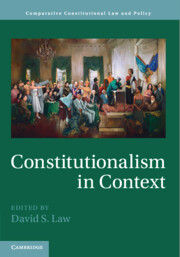Book contents
- Reviews
- Constitutionalism in Context
- Comparative Constitutional Law and Policy
- Constitutionalism in Context
- Copyright page
- Dedication
- Contents by Topic
- Contents by Region
- Figures
- Tables
- Contributors
- User’s Guide and Preface
- Abbreviations
- I Introduction to the Field
- II Concepts and Definitions
- III Constitutional Drafting and Revision
- 5 Constitution-Making for Divided Societies: Afghanistan
- 6 Constitutional History and Constitutional Migration: Nepal
- 7 Constitutional Transformation: Hungary
- 8 International Law and Constitution-Making: Sudan
- IV Constitutional Adjudication and Interpretation
- V Rights
- VI Structure
- VII Challenges to Liberal Democratic Constitutionalism
- Index
- References
8 - International Law and Constitution-Making: Sudan
from III - Constitutional Drafting and Revision
Published online by Cambridge University Press: 17 February 2022
- Reviews
- Constitutionalism in Context
- Comparative Constitutional Law and Policy
- Constitutionalism in Context
- Copyright page
- Dedication
- Contents by Topic
- Contents by Region
- Figures
- Tables
- Contributors
- User’s Guide and Preface
- Abbreviations
- I Introduction to the Field
- II Concepts and Definitions
- III Constitutional Drafting and Revision
- 5 Constitution-Making for Divided Societies: Afghanistan
- 6 Constitutional History and Constitutional Migration: Nepal
- 7 Constitutional Transformation: Hungary
- 8 International Law and Constitution-Making: Sudan
- IV Constitutional Adjudication and Interpretation
- V Rights
- VI Structure
- VII Challenges to Liberal Democratic Constitutionalism
- Index
- References
Summary
Though constitutional drafting is a national affair, it is not isolated from the international legal setting in which it is embedded. Sometimes, the process of drafting itself may be directly governed by international law (for example, a United Nations mandate). On other occasions, constitutional design may be influenced by incentives generated by international law (such as EU membership). Either way, the creation of a new constitution invariably requires reflection upon the status and role of international law in the normative hierarchy of a country. Using Sudan as a case study, this chapter explores the significant role played by international law in the drafting of the Comprehensive Peace Agreement and the Interim National Constitution of 2005.
Keywords
- Type
- Chapter
- Information
- Constitutionalism in Context , pp. 157 - 182Publisher: Cambridge University PressPrint publication year: 2022

